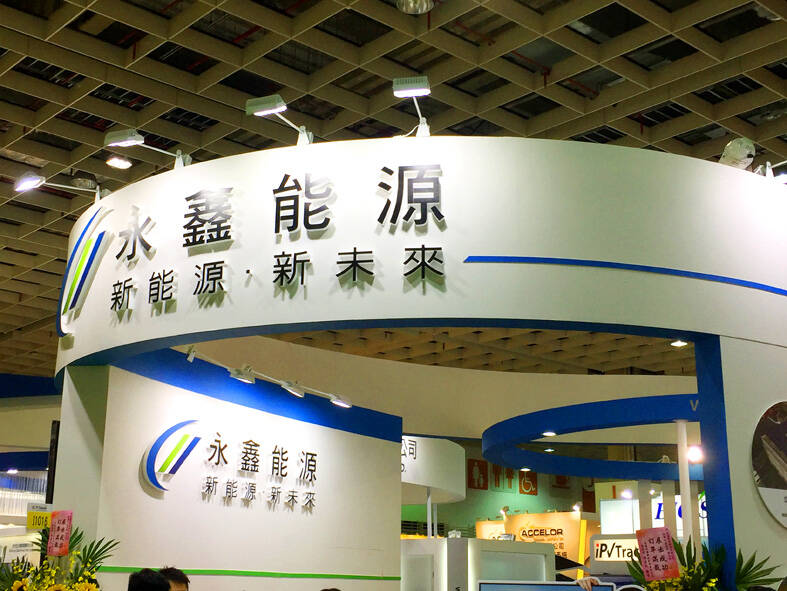Google on Monday said it is planning to invest in New Green Power Co (NGP, 永鑫能源), a solar energy developer owned by BlackRock Inc, to build 1 gigawatt of solar capacity in Taiwan to supply clean energy for its local data center and offices.
“Our investment in NGP, subject to regulatory approval, will serve as development capital toward its 1 GW pipeline of new solar projects, catalyzing critical equity and debt financing for those projects,” Google’s Data Center Energy global head Amanda Peterson Corio wrote on a company blog.
It did not disclose financial details.

Photo: Chang Hui-wen, Taipei Times
“We expect to procure up to 300 megawatts of solar energy from this pipeline through power purchase agreements and the associated energy attribute certificates (Taiwan Renewable Energy Certificates or T-RECs) to help meet electricity demand from our data center campus, cloud region and office operations in Taiwan,” Corio wrote.
Google has been operating a US$600 million data center in Changhua County since 2013.
The company might take a step further by offering a portion of this clean energy capacity to its semiconductor and manufacturing partners in the region so they can advance their sustainability goals while helping Google reduce its Scope 3 emissions, the indirect emissions from its value chain, Corio wrote.
“As we witness growth in demand for digital services, powered by artificial intelligence and data center technologies, it becomes imperative to invest in clean energy,” BlackRock global head of climate infrastructure David Giordano said on the Google blog.
Google’s new solar investment has helped boost the share prices of the nation’s major solar module manufacturers amid expectations that the large-scale clean energy project would stimulate solar module demand locally given Taiwan’s complete solar energy supply chain.
Google’s plan to build 1 gigawatt of solar energy is equal to 40 percent of the nation’s solar energy installation totaling 2.5 gigawatts last year.
The stock prices of Motech Industries Inc (茂迪), TSEC Corp (元晶) and United Renewable Energy Co (聯合再生) yesterday rallied 9.95 percent, 10 percent and 9.81 percent to close at NT$34.25, NT$31.35 and NT$14.55 respectively.
Google’s latest solar energy project could help alleviate the tight supply of green energy in Taiwan.
To address that issue, the Taiwan Photovoltaic Industry Association (台灣太陽光電產業協會) said it has proposed to the nation’s major power users, mostly technology companies, to build their clean energy capacity and most of them agreed.

TAKING STOCK: A Taiwanese cookware firm in Vietnam urged customers to assess inventory or place orders early so shipments can reach the US while tariffs are paused Taiwanese businesses in Vietnam are exploring alternatives after the White House imposed a 46 percent import duty on Vietnamese goods, following US President Donald Trump’s announcement of “reciprocal” tariffs on the US’ trading partners. Lo Shih-liang (羅世良), chairman of Brico Industry Co (裕茂工業), a Taiwanese company that manufactures cast iron cookware and stove components in Vietnam, said that more than 40 percent of his business was tied to the US market, describing the constant US policy shifts as an emotional roller coaster. “I work during the day and stay up all night watching the news. I’ve been following US news until 3am

UNCERTAINTY: Innolux activated a stringent supply chain management mechanism, as it did during the COVID-19 pandemic, to ensure optimal inventory levels for customers Flat-panel display makers AUO Corp (友達) and Innolux Corp (群創) yesterday said that about 12 to 20 percent of their display business is at risk of potential US tariffs and that they would relocate production or shipment destinations to mitigate the levies’ effects. US tariffs would have a direct impact of US$200 million on AUO’s revenue, company chairman Paul Peng (彭雙浪) told reporters on the sidelines of the Touch Taiwan trade show in Taipei yesterday. That would make up about 12 percent of the company’s overall revenue. To cope with the tariff uncertainty, AUO plans to allocate its production to manufacturing facilities in

Six years ago, LVMH’s billionaire CEO Bernard Arnault and US President Donald Trump cut the blue ribbon on a factory in rural Texas that would make designer handbags for Louis Vuitton, one of the world’s best-known luxury brands. However, since the high-profile opening, the factory has faced a host of problems limiting production, 11 former Louis Vuitton employees said. The site has consistently ranked among the worst-performing for Louis Vuitton globally, “significantly” underperforming other facilities, said three former Louis Vuitton workers and a senior industry source, who cited internal rankings shared with staff. The plant’s problems — which have not

TARIFF CONCERNS: The chipmaker cited global uncertainty from US tariffs and a weakening economic outlook, but said its Singapore expansion remains on track Vanguard International Semiconductor Corp (世界先進), a foundry service provider specializing in producing power management and display driver chips, yesterday withdrew its full-year revenue projection of moderate growth for this year, as escalating US tariff tensions raised uncertainty and concern about a potential economic recession. The Hsinchu-based chipmaker in February said revenues this year would grow mildly from last year based on improving supply chain inventory levels and market demand. At the time, it also anticipated gradual quarter revenue growth. However, the US’ sweeping tariff policy has upended the industry’s supply chains and weakened economic prospects for the world economy, it said. “Now